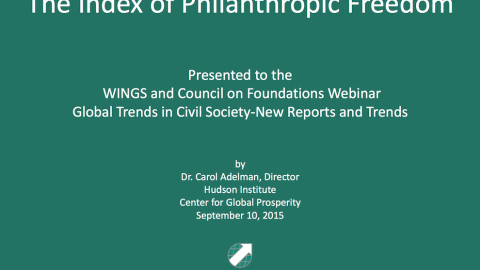Carol Adelman, director of the Center for Global Prosperity at the Hudson Institute, spoke on Hudson Institute’s new report, The Index of Philanthropic Freedom 2015. With this publication, Hudson Institute set out to measure, quantify, and compare the ease of global philanthropic giving in a number of countries around the world. Hudson Institute sought this data for a number of reasons. While philanthropy and remittances are an increasingly important part of the financial flows from developed to developing countries, ease of giving has never been systematically measured across a large sample size on specific philanthropic indicators. Organizing this information on barriers and incentives for global giving makes it easier to recognize, study, and implement policy changes.
Philanthropy is increasingly becoming recognized as an integral part of development. This report allows governments to see how they are being restrictive to philanthropy and, therefore, development. Expert opinion surveys from 64 countries show a number of trends and themes. Foreign exchange regulations and capital controls were listed as a significant barrier in 16 of the surveyed countries. Illicit financial flow legislation was a barrier in 33 of the surveyed countries. Discriminatory treatment of foreign donations has begun to spread from Russia to Eastern Europe and Central Asia. Also, restrictions on the ability of a CSO to incorporate and operate have increased substantially. Hudson Institute’s scoring of CSO regulations, tax regulations, and cross-border regulations, combined with the qualitative analyses of country experts, has created a comprehensive data set by which to compare the feasibility of global giving in different countries worldwide.
These reports clearly show how conversation and reporting on this topic are increasing. There is an increased understanding that these regulations are truly harmful to the philanthropic sector and action needs to be taken. Politicians and international human rights groups are becoming increasingly aware, but the single most important step is to increase public awareness. Public support for the work of CSOs and foundations will be the most effective way to affect policy that is conducive to the international philanthropic sector.




















